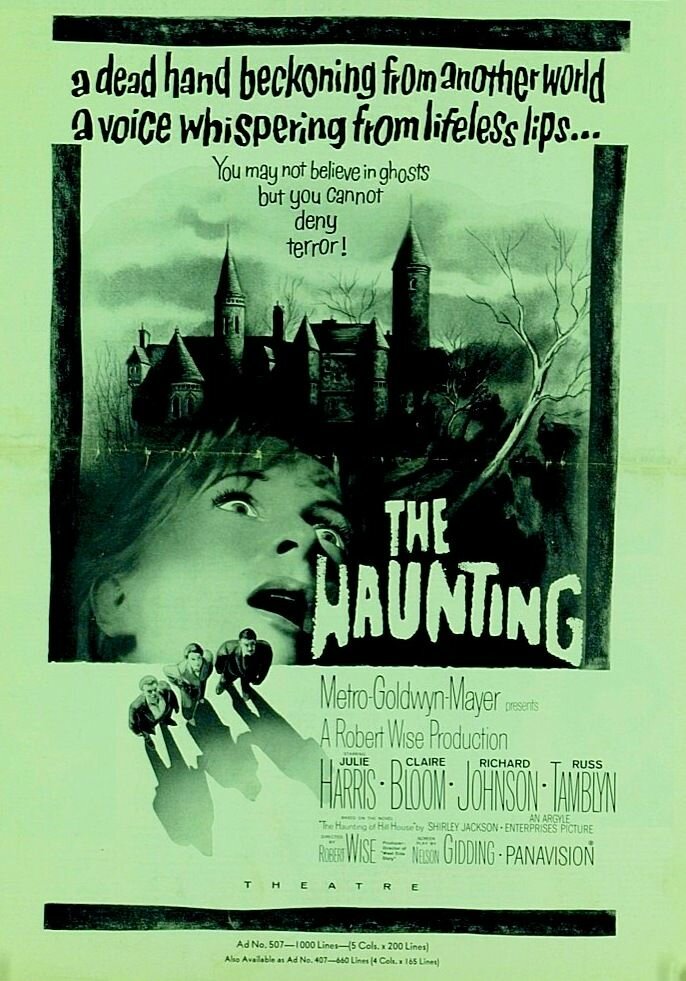When I was in 3rd or 4th grade I considered myself a horror film aficionado – mostly watching old horror classics on Friday nights like the original Dracula, or more recent B-rated schlock, like Jack Nicholson in The Terror. Then one evening I began watching 1963’s The Haunting, and had to shut it off after the first few scenes. I didn’t finish the movie until years later. The fright was from pure atmospherics; there’s no monsters jumping out at you, no blood, flesh and gore flying about – but it’s was like walking into someone else’s black & white nightmare. Martin Scorsese ranked it the best horror film of all time.
The film begins with Dr. John Markway, a paranormal investigator, narrating the twisted history of Hill House (a supposedly haunted New England Mansion in the middle of nowhere, but unlike any house I’ve ever seen there, up to and including Newport). He has invited two ladies: Theo, who is a psychic, and Eleanor, who had experienced poltergeist activity as a child and has just come off years of tending to her sick mother, recently deceased. The cynical nephew of the owner of the house is along for the ride:
Julie Harris, who played Eleanor (or Nell) apparently engaged in a bit of unintentional method acting – the actress was suffering bouts of depression while filming and harnessed it into her performance, which was superb. At first the viewer is not sure if the happenings are all in Nell’s fragile and damaged mind, but it soon is clear that the house is pulling her close because of that damaged mind. In one scene she is sleeping in the same bed with Theo (we won’t go there – remember this is 1963) and awakens in the dark to hear sinister mumbles and a child’s cries. She is afraid to cry out, and feels Theo holding her hand tightly. She fully awakens to realize she had switched to sleeping in the chaise lounge across the room from Theo, who could not possibly be the one who was holding her hand so hard. Nell is both repulsed by and attracted to Hill House. How is this resolved? Watch it yourself, if you dare….
The Devil’s Advocate, staring Al Pacino and Keanu Reeves, is at the opposite end – here the evil seems to arise from what amounts to a twisted, elaborate lawyer joke. An up-and-coming small town lawyer, Kevin Lomax (Reeves) is defending a teacher accused of child molestation. He knows his client is as guilty as the day is long, but his cross-examination guts the main witness like a fish. He is then invited to join a powerful law firm in Manhattan headed by Pacino’s character, John Milton. Yes, yes. There are allusions to Paradise Lost, Faust, and Dante’s Inferno. There’s no need to work hard trying to guess his real name (as the Rolling Stones’ sympathy would suggest). Like Jesus in the desert, Lomax is offered anything he could possibly think of – wealth, power, bliss… He doesn’t answer with scripture, though, as Jesus did, and so the plot is allowed to develop:
The film works its way back around to the trial of the teacher. Now supposedly enlightened, Lomax withdraws from the case, despite the threat of sanctions from the bar. Pacino has a tour de force soliloquy before that, elaborating upon the Miltonian “t’is better to rule in hell than to serve in heaven” theme, laying out with specificity how mundane (i.e. worldly) evil seeps into our souls. We leave ourselves open to it when as faithful we forget that man’s purpose is to glorify his Creator, or in a more secular view, lose sight of the fact that true satisfaction can only come from a purpose-driven life, wherein the purpose itself is worthy.
There is unintentional irony in the film’s last scenes. The audience is expected to applaud Lomax’s withdrawal from the teacher’s case, thus sealing his fate as a child molester. Have we forgotten what John Adams taught us when he defended the Redcoats accused in the Boston Massacre? Our rights depend upon preserving the rights of even the most vile among us. We let evil loose when we cut down law to get at evildoers:
Thomas More, A Man for All Seasons:
“…and when the last law was down, and the Devil turned around on you – where would you hide, Roper, the laws all being flat? This country’s planted thick with laws from coast to coast – man’s laws, not God’s – and if you cut them down… d’you really think you could stand upright in the winds that would blow then? Yes, I’d give the devil benefit of law, for my own safety’s sake.”



Comments
1
Leave a Reply
David, my vote is with the Haunting. I get chills just thinking about that movie. The Nell and Theo scene you describe is a profound moment of fright. However, I really enjoyed The Devil’s Advocate for its good/evil dialogue and entertaining plot.